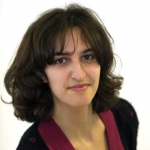Covering Syria through hunger and fear
For Karam al-Masri, AFP's reporter, photographer and videojournalist in rebel-held Aleppo, the past five years have been a series of tragedies: detention by the regime, and then the Islamic State group, the death of his parents in an air strike, the siege of his hometown, hunger and bombardment. Though it all, he has continued to report, with unwavering courage, the story of his ravaged city.
Herewith his story, in his own words and those by Rana Moussaoui, his colleague in Beirut who works with him daily.
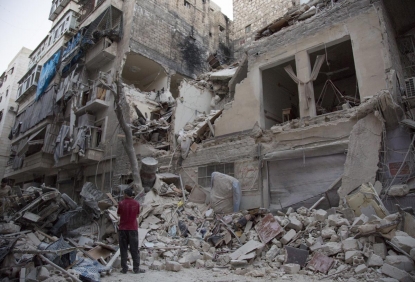 Aleppo, June, 2016.
(AFP / Karam Al-masri)
Aleppo, June, 2016.
(AFP / Karam Al-masri)Aleppo, Syria - Before the revolution in Syria began in 2011, my life was very simple. I was a law student at Aleppo University. But today, I’ve lost everything -- my family, my university. I'm an only child. What I miss most is my family, my father, my mother. Particularly her. I think about her every day, I see her in my dreams. To this day, losing her hurts me. I live alone, I don't have anyone. Most of my friends are gone, either dead or in exile.
My life since the beginning of the bombing in Aleppo has become about trying to stay alive. It is like I live in the jungle and I'm trying to survive until tomorrow. When the planes come, I try to shelter in a more secure building. When there is artillery fire, I go to the lower floors. I'm constantly fleeing. Before the siege, I relied on fast food places, but now everything is closed. I don't know how to cook, and there are days when I only eat one meal, and others when I have none at all. Before the siege, I spent the day outside looking for stories to film. But since the siege, I'm hungry and weaker and I stay at home more.
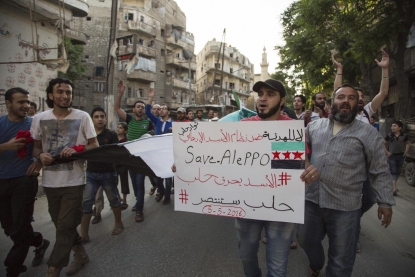 Anti-regime demonstration in Aleppo, May, 2016.
(AFP / Karam Al-masri)
Anti-regime demonstration in Aleppo, May, 2016.
(AFP / Karam Al-masri)When the uprising began in 2011, I was nearly 20 years old. Two or three months later, I was arrested by the regime's political intelligence services. I spent a month in prison, including a week in complete isolation in a tiny cell. It was awful, but I was released during an amnesty in 2011. At the beginning of the uprising there were peaceful demonstrations. There was no bombing. There was nothing to fear except detention and snipers in the street.
The following year, in July 2012, Aleppo was divided into two, with the eastern side held by rebels and the western side by the regime. In November 2013, when I was 22, I was kidnapped by Daesh (Islamic State group). They took me from an ambulance with my friends, a paramedic and a photographer. We were all taken to an unknown location. It was worse than the regime's prisons. It was very, very tough.
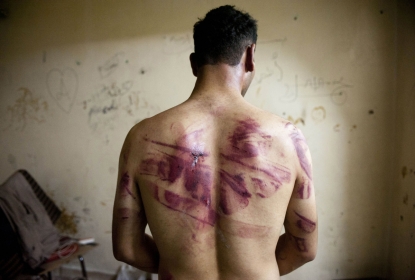 A Syrian man shows marks of torture on his back after being released from custody by regime forces in Aleppo, August, 2012. (AFP / James Lawler Duggan)
A Syrian man shows marks of torture on his back after being released from custody by regime forces in Aleppo, August, 2012. (AFP / James Lawler Duggan)The photographer and I were released six months later after an "amnesty" but our third friend, the paramedic, wasn't as lucky. He was decapitated after 55 days in prison. They filmed it and showed us the video: "Look at your friend, that's what will happen to you soon." We were utterly terrified. I was constantly afraid. I thought "tomorrow it will be my turn, the day after tomorrow it will be my turn."
I still remember every detail. The 165 days in IS detention are etched into my memory. In the first 45 days, they only fed us every three days. The food was a half portion of Arabic flatbread, or three olives or an egg. I didn't see a single shabbih (pro-regime militant) -- all those held with us were rebels, activists and journalists.
I was tortured during both detentions, but it was worse with the regime because they wanted me to confess who I was working with. With Daesh, the charges were set from the beginning -- I had a camera and for them I was an infidel -- so there was no need to interrogate me.
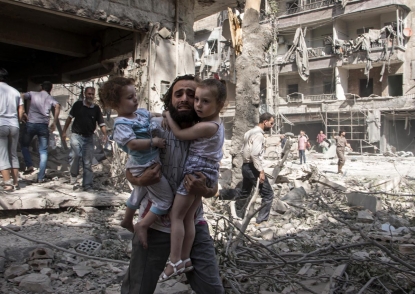 Aftermath of a barrel bomb attack in Aleppo, September, 2015.
(AFP / Karam Al-Masri)
Aftermath of a barrel bomb attack in Aleppo, September, 2015.
(AFP / Karam Al-Masri)I lost my family at the beginning of 2014, when I was still being held by IS. A barrel bomb hit our building, killing all the residents inside, including both my parents. I only found out when I was released. My friends tried to persuade me not to go to my house and told me what had happened. I spent a month in complete despair. I knew nothing about my parents when I was in prison, and then when I was released, they were gone. They had been waiting for news about me, and in the end, they weren't there to celebrate my release.
In 2016, the city came under siege. But for me the siege is less difficult than prison, and the loss of my parents.
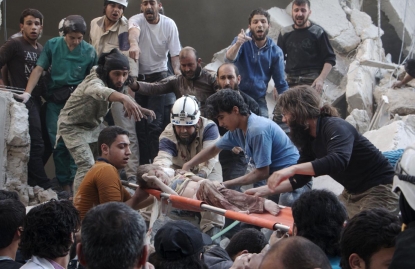 A child is evacuated from a building following a reported barrel bomb attack in Aleppo, May, 2015.
(AFP / Karam Al-masri)
A child is evacuated from a building following a reported barrel bomb attack in Aleppo, May, 2015.
(AFP / Karam Al-masri)I got the idea of becoming a cameraman in 2012, when I filmed protests with my cellphone and uploaded the images online to show what was really happening, that it wasn't just 10 people or just terrorists like the regime said. There were people who didn't want the regime anymore, they wanted freedom, democracy, justice. In 2013, I started as a freelancer with AFP and gradually I improved. I would watch reports on foreign channels and see how they filmed, what angles they used, and try to do the same.
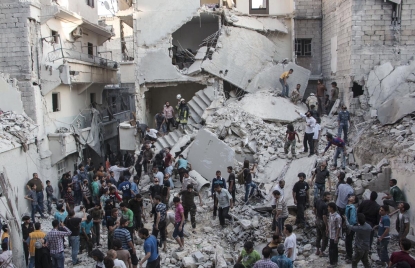 Aftermath of an air raid in Aleppo, May 2015.
(AFP / Karam Al-masri)
Aftermath of an air raid in Aleppo, May 2015.
(AFP / Karam Al-masri)I never thought about becoming a reporter, but over time I've come to like this job. I have enormous respect for journalism, and I'm honest in how I practice it. Even if I sympathise with the opposition and I live in opposition-held territory, even if I participated in anti-regime demonstrations, I avoid filming subjectively and taking the opposition's side in my work. I think this job is sacred, and I'm very careful. If something is in doubt, or doesn't seem real, I don't film it.
Working with journalists abroad, or outside of the besieged areas is like a window for me to send a message to the outside world.
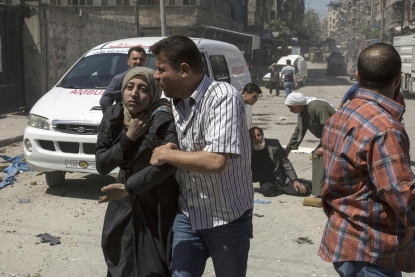 Aftermath of an airstrike, Aleppo, April, 2016.
(AFP / Karam Al-masri)
Aftermath of an airstrike, Aleppo, April, 2016.
(AFP / Karam Al-masri)The massacres and the bombings have become normal, along with images of children under rubble, the injured, bodies torn to pieces. I've gotten used to it, not like before. At the end of 2012, during the first massacre, when I saw a man with his leg torn off, I felt ill and I fainted at the sight of blood, because it was the first time. Now it's something normal to me.
The hardest thing for me would be going back to my family home. Until today, I haven't had the strength to go. Since 2014, it’s the only area in Aleppo that I prefer to avoid, I can't bear to. It would stir up old memories. I'm told the building has been destroyed…
'Karam ya Karam, how are you? What's happening?'
By Rana Moussaoui
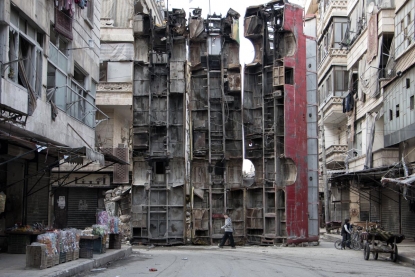 A makeshift barricade, made of wreckages of buses, lies in a street in Aleppo, to obstruct the view of regime snipers, March, 2015.
(AFP / Karam Al-Masri)
A makeshift barricade, made of wreckages of buses, lies in a street in Aleppo, to obstruct the view of regime snipers, March, 2015.
(AFP / Karam Al-Masri)Beirut -- Listening to Karam's voice everyday, it is almost impossible to believe the horror this level-headed young man has lived through in the last five years. His voice is calm, he never panics, even when the bombs are falling all around him. The war has taken everything from him, except his passion to inform... and his sense of humour.
Karam started with AFP in 2013, taking photos, and then the video service became interested in him. “We needed to find a new stringer in Aleppo,” says Quentin Leboucher, AFP TV's coordinator for the region. “Karam had worked for the photo service, and we contacted him. He pitched a first story, on the bathhouses of Aleppo. I was immediately taken by the precision of his work. When we recruit stringers, we send them a manual to explain AFP TV's format. Karam followed it to the letter. His images didn't even have to be edited.”
“So we asked him for more,” added Leboucher. “Karam pitched us a story about an old man who had chosen to stay in Aleppo despite the war to take care of his car collection. It had everything. He gave us everything we needed to tell the story. The images were touching and I remember in particular a sequence of the man listening to a record on his gramophone.”
“We immediately realised the quality of his work and his potential. He's become our top contributor in Aleppo.”
Two other AFP photographers, Thaer Mohammed and Ameer al-Halbi, are in the same situation in the east of the city.
The Beirut bureau has been in charge of covering the Syrian conflict since 2012, and since February 2016, we've “lived” daily life with Karam. He started off by giving us little bits of information. But then, after impressing us with his rigour and accuracy, we started asking him for full stories.
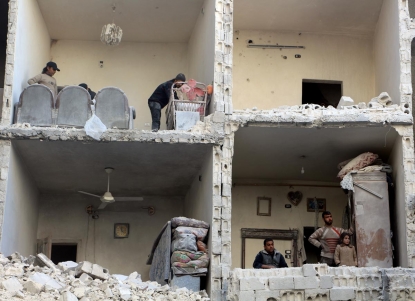 Aleppo, December, 2015. (AFP / Karam Al-masri)
Aleppo, December, 2015. (AFP / Karam Al-masri)A ceasefire in February gave him the chance to do stories about the disoriented residents of Aleppo, out again in the streets on the first day of the truce after years of bombardment: the doctors and rescue workers experiencing quiet, the rebels who used the halt in fighting to play video games or do shopping, and the taxi drivers who expressed hope that business might pick up.
But his Aleppo had also become a city “dying of thirst” after the destruction of pumping stations, and a place with barely a single window left unshattered by the bombing. He did a story on both subjects, which affect both sides of Aleppo, with contributions from a journalist living across the frontline in government-controlled western Aleppo.
With the siege that began in July, his stories have been increasingly focused on the shortages that have forced people to survive on little more than a bit of purslane and aubergine, grown locally, or make fuel from plastic bottles. When another short-lived truce took hold, he produced a report on the children who took to the streets to enjoy the fresh air and play on makeshift swings.
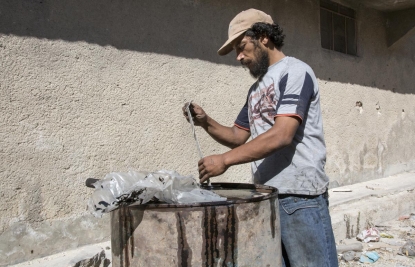 A Syrian man fills a barrel with plastic as part of efforts to produce homemade fuel. Aleppo, September, 2016.
(AFP / Karam Al-masri)
A Syrian man fills a barrel with plastic as part of efforts to produce homemade fuel. Aleppo, September, 2016.
(AFP / Karam Al-masri)Karam's preferred method of communication is the WhatsApp messaging service, which is quick and efficient. We've created a WhatsApp group – 'Aleppo with Karam' – that we use to communicate with him, as we do with other AFP correspondents in Syria. The conversations last all day long and into the night. Invariably they start around the time our office opens with “Karam, ya Karam, how are you? What's happening?” We're not just asking about the situation on the ground, but about him. “Reassure us, how are you? Where are you?”
Karam loves to express himself with emojis, and with his city under siege and almost relentless bombardment, they are often sad. When bombs fall around him, he tells us and adds an emoji of a face pale with fear or dripping with sweat. “The barrel bombs are falling like rain,” he writes. “A shell just hit right next to my house.”
When the siege was briefly broken by rebels in early August, he messaged happily one day to inform us “I ate pizza”, accompanied, of course, by an emoji of a face with its tongue poking out. But the siege was reimposed soon after, and often he tells us he is “looking for something to eat.”
“Have you heard anything new about the aid? Where is the convoy?” he will ask, hoping we have new information from the UN. Our anglophone colleague Maya one morning asked if he'd had a coffee yet – “There hasn't been coffee for a month,” he replied. Meanwhile we guiltily sip our large mugs of Americano or cafe au lait, available at any hour of the day.
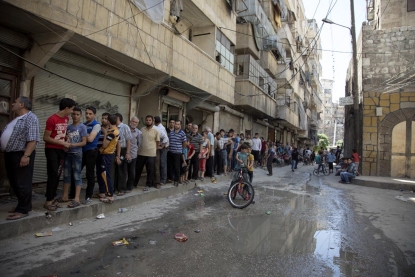 Aleppo residents line up to buy bread, July, 2016.
(AFP / Karam Al-masri)
Aleppo residents line up to buy bread, July, 2016.
(AFP / Karam Al-masri)Karam's WhatsApp profile often contains a phrase – for much of the siege it has read “The smell of hunger is frightening.” Recently, he told our Arabophone colleague Rouba that his favourite food is french fries but he has “forgotten what a potato even looks like.” He dreams of being able to eat kiwis and cherries again.
“I weigh 58 kilos now. Two months ago, before the siege, I weighed 67,” he says, before joking “I've gotten used to eating parsley. I like it now. My cat Nanoush is on a diet, like me, and has also lost weight.”
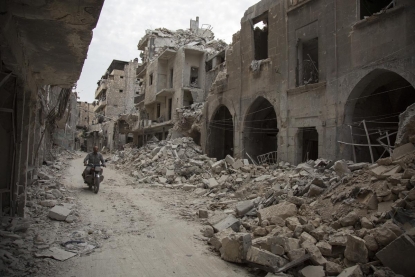 Aleppo, May, 2016.
(AFP / Karam Al-masri)
Aleppo, May, 2016.
(AFP / Karam Al-masri)The fuel shortages also mean that the two gas canisters he still has are worth a “fortune.” “I'm hoping for lots of offers to sell them,” he laughs.
“It breaks my heart when we're talking about a story we want him to cover and he tells us he is hungry. That's the hardest thing,” says Layal, another Arabophone journalist in Beirut.
Since the most recent truce effort broke down on September 19, Syrian and Russian aircraft have pounded eastern Aleppo with virtually unprecedented firepower, and Karam's messages have become increasingly sombre.
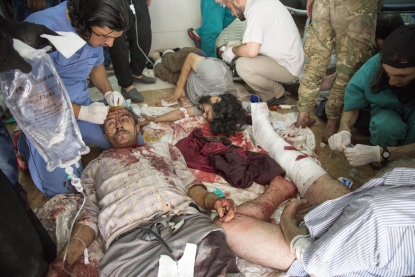 Wounded in an Aleppo hospital following an air strike, September, 2016.
(AFP / Karam Al-masri)
Wounded in an Aleppo hospital following an air strike, September, 2016.
(AFP / Karam Al-masri)Wednesday September 21
“The bombing is so intense it is lighting up the sky like fireworks,” he writes.
“I'm hiding in the corridor,” he tells us.
“I'm hiding in one of the rooms.”
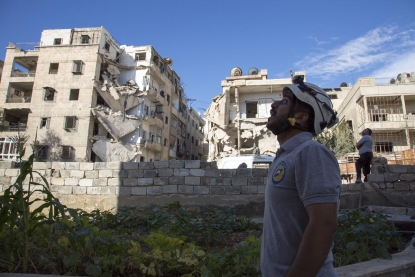 Rescue worker in Aleppo, September, 2016.
(AFP / Karam Al-masri)
Rescue worker in Aleppo, September, 2016.
(AFP / Karam Al-masri)Thursday September 22
“We're surrounded by death”.
“There's no escape.”
“Where can I hide?”
“Aleppo is on fire, I don't have any doors or windows left. The buildings all around me are on fire,” he writes, sending us images of flames filmed with his cellphone. His habitual emojis are in tears.
But his sense of humour is back just hours later, when Maya asks him about his plans for the day. “I'm going to repair my windows and doors,” he responds with a smiley face.
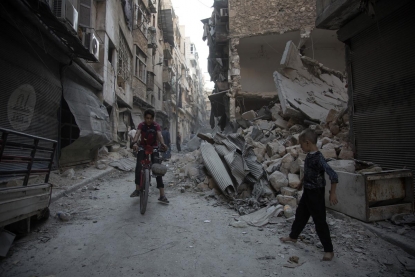 Aleppo, September, 2016. (AFP / Karam Al-masri)
Aleppo, September, 2016. (AFP / Karam Al-masri)Friday September 23
“I haven't closed my eyes even once. The smell of gunpowder is overpowering, I can't breathe.”
“Where could I go? Nowhere. We are waiting for death turn by turn.”
“It is the first time that I've seen this level of destruction. What's happening now is as destructive as all the bombing of the last three years,” he tells me by phone.
Karam has received two awards for photos he has taken for AFP, but he remains impossibly modest and gentle. He apologises when he is out of reach because the internet is down or his battery is drained because of the ongoing electricity cuts.
My anglophone colleague Sara tells me she feels helpless when she asks Karam how he is doing, amid such evident horror. “Everything I say to him feels utterly inadequate,” she says.
Last week, he discovered with joy a story done by one of our journalists in government-held territory in Aleppo on Saeed (Happy), a monkey who has been a star attraction at a local makeshift zoo for nearly 25 years.
“I remember the monkey from when I was five years old. We're the same age,” he jokes.
“But he has gotten old. I'm still young.”
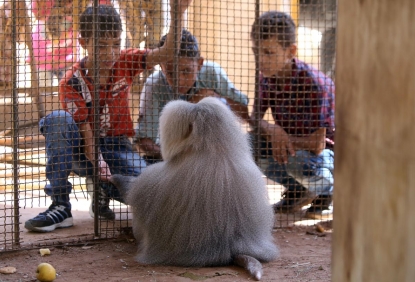 Saeed, the star attraction in Aleppo's makeshift zoo. (AFP / Youssef Karwashan)
Saeed, the star attraction in Aleppo's makeshift zoo. (AFP / Youssef Karwashan)(This blog was written with Rana Moussaoui and translated by Sara Hussein in Beirut, with contributions from the Beirut bureau and Nicosia video department.)



